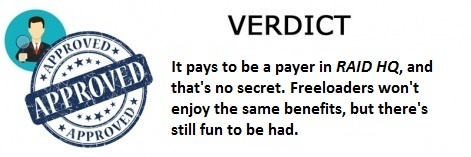Welcome back to the In-App Purchase Inspector- our regular look at free-to-play games from the consumer's perspective.
In each instalment, we consider the incentives or pressure applied to make in-app purchases, their perceived value, the expansion offered by IAPs and the overall value of the experience.
The end goal is to see whether the game makes a good enough case for us to part with our cash, or whether players are content - or engaged enough - to 'freeload'.
This time, we're taking a look at UK studio Eight Pixels Square's RAID HQ, a hybrid between base-builder and scrolling shoot-'em-up.
Best of both
This series has covered a lot of games that endeavour to do something fresh with the base builder genre.
- Path of War opted for lane-based battlefields a la Plants vs. Zombies,
- Dawn of Steel gave players direct control over hulking mechs, and
- The Incorruptibles offered a much more complex strategic experience.
RAID HQ has more common DNA with Ikari Warriors than Clash of Clans.
However, all of these innovations are rooted in the strategy genre.
What makes RAID HQ so bold, then, is that it strips out the strategic combat altogether, replacing it with gameplay that has more common DNA with classic shmups like Ikari Warriors than it does with Clash of Clans.
The end product is a game that boasts all the comforting familiarity of a base builder, but with hectic, bullet-dodging gameplay that - in context of its long absence from mainstream gaming - has come full circle, feeling fresh and new again.
Card sharp
Speaking to PocketGamer.biz upon the game's launch, Eight Pixels Square co-owner Hugh Binns described RAID HQ as “a culmination of all our work so far.”
And indeed, it is the firm's best attempt to create a free-to-play shooter on mobile to date.
The key is the card system, which has you assembling the best four-person squad you can muster.
Each comes with its own colour - a Rock, Paper, Scissors system of strengths and weaknesses - and you can switch between them in the heat of battle.
These cards are divided into Common, Rare, Epic, and Legendary tiers.
They're given out as rewards for meeting objectives, or bought using hard currency - either through gacha chests, or as part of timed sales.
It's the desire to upgrade your squad that's most likely to get you spending.
Much like in Clash Royale, duplicate cards can be combined (with a dash of soft currency) to create an upgraded version.
Feeding into the so-called Collection-Fusion-Gacha monetisation, it's the desire to get the cards to enable you to upgrade your squad that's most likely to get you spending.
Down to business
There are two main currencies in RAID HQ: the hard currency is Gems, and the soft is Gold.
The former is used to buy card packs, chests, missing resources, and to skip wait timers, while the latter is used to promote squad cards and build/upgrade structures at the base.
There's also Elixir, a resource used primarily to build and upgrade higher-level buildings.
Gem packs range from 500 for $4.99 to 14,000 for $99.99. You can also earn a single Gem for watching a rewarded video ad, which seems like an offer few would take up.
In fact, it's emblematic of the game's wider approach to incentivised video ads - they are integrated, but not as an alternative to spending.
For instance, watching a video ad can knock 10 minutes off a building or upgrade wait timer. However, with the process often taking more than an hour, it's not a viable option to watch ads alone.
Instead, Eight Pixels Square provides a greater incentive for players to spend, by going above and beyond the lure of hard currency alone with its VIP Club. What's powerful about this is that the benefits last throughout your entire time with the game.
The VIP Club is powerful because its benefits last throughout your entire time with the game.
For instance, a purchase of 500 Gems permanently upgrades the 3-hourly Free Chest to a VIP Chest, offering a better chance of getting Rare cards. It also gives you a 10% resource boost on all raids by default (non-payers have to watch an ad) and gives you a VIP icon for all to see.
It's a common approach in Asia, where VIP systems and paid-for cosmetic items are very popular as a status symbol for paying players.
Is inclusion, then, is perhaps unsurprising given that these territories are a significant part of the firm's strategy.
Locked in
Everything about RAID HQ seems to be geared towards strong retention. Its keenness to get you in the VIP Club is because that offers the player long-term privileges, which they'll be loath to neglect.
It also lets the players enjoy the game whenever, and for as long, as they like, with no energy system to speak of.
Even the cost of searching for a new player to raid is a mere 10 Gold - and, at a higher tier in the VIP Club, can be removed entirely.
It's reflected in the starter bundle retailing, too.
RAID HQ is a game that's more generous to spenders than it is to freeloaders.
For a price of $2.99, RAID HQ's introductory 'Gem Booster' offers 600 Gems and an Epic Card. But crucially, you get only 300 up front.
The rest comes in the form of 50 per day for the next 6 days, with the Epic card saved for the final day.
It's a great offer, giving a 50% discount on the normal price and inducting you into the VIP Club.
But RAID HQ is a game that's more generous to spenders than it is to freeloaders, and it makes no bones about it.
The two are not of equal worth to Eight Pixels Square, so why should they be made to feel as such?
The intention is to make spending feel worthwhile to the player, and I feel RAID HQ achieves that.























